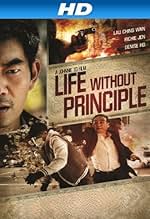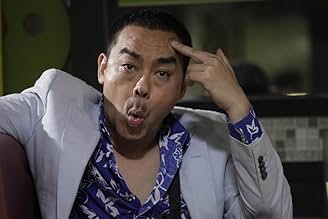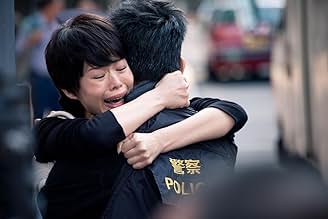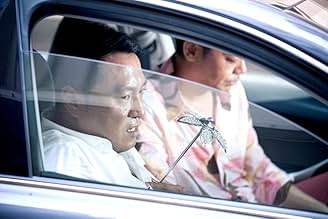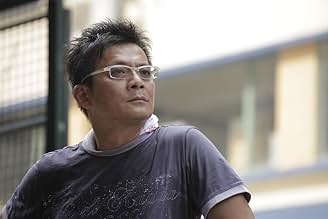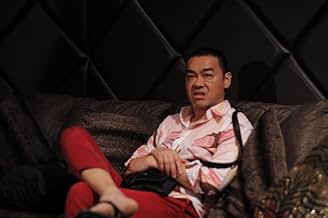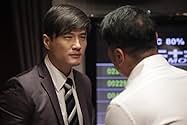VALUTAZIONE IMDb
6,9/10
2908
LA TUA VALUTAZIONE
Aggiungi una trama nella tua linguaThree people - a criminal, a bank officer and a cop - end up in a catastrophic situation in the midst of a global economical crisis and are forced to betray any morals and principles to solv... Leggi tuttoThree people - a criminal, a bank officer and a cop - end up in a catastrophic situation in the midst of a global economical crisis and are forced to betray any morals and principles to solve their financial problems.Three people - a criminal, a bank officer and a cop - end up in a catastrophic situation in the midst of a global economical crisis and are forced to betray any morals and principles to solve their financial problems.
- Premi
- 17 vittorie e 28 candidature totali
Ching-Wan Lau
- Panther
- (as Ching Wan Lau)
Richie Jen
- Inspector Cheung
- (as Richie Ren)
Eddie Cheung
- Wah
- (as Siu-Fai Cheung)
Siu-Kay Lee
- Brother Four
- (as Siu-Kei Lee)
Recensioni in evidenza
Crime drama surrounding financial crisis's , with classic Johnnie To themes ...
------- Movie follows multiple characters (officer, bank clerk, gangster) connected to a loan shark's death . 10 million dollars are missing in the process ..
Same time officer's wife and their foster child are looking for a home in an unstable housing market.. The bank clerk is signing people up for high-risk investments that are bound to fail.. And the gangster has luck for being the bail-out service boy , sole purpose to bail other gangsters out of the trouble they cause for themselves ..
Some investigating, robberies, car break-ins, funny police arrests, rose-petal daggers, stolen money femme ...... Johnnie To elements ..
7/10
------- Movie follows multiple characters (officer, bank clerk, gangster) connected to a loan shark's death . 10 million dollars are missing in the process ..
Same time officer's wife and their foster child are looking for a home in an unstable housing market.. The bank clerk is signing people up for high-risk investments that are bound to fail.. And the gangster has luck for being the bail-out service boy , sole purpose to bail other gangsters out of the trouble they cause for themselves ..
Some investigating, robberies, car break-ins, funny police arrests, rose-petal daggers, stolen money femme ...... Johnnie To elements ..
7/10
This is certainly a departure from Johnnie To's usual work, but nonetheless, it is a film that is easy to like and relate. With the Greek financial crisis as the backdrop for a story about greed, human nature and life. It is one of those films that does not feel like a complete episode, but rather the sums of its parts. What I like about To's film is that they are so efficient and there is also recurring themes in all his films – life is about taking chances, random events of luck, expect the unexpected and the human nature of greed. His ability to present simple stories into a smooth cinematic experience is simply wonderful to endure. Although the film breaks no new grounds on the topic of greed in the financial market and especially Hong Kong people, it is still a worthy addition to 2011's HK cinema. Perhaps two words that best describe this film would be - simple and efficient. After all, as Mr. Geeko used to say - "Greed is good"...
Neo rates it 7.5/10
Neo rates it 7.5/10
- www.thehkneo.com
Johnnie To, the Godfather of Hong Kong, is the doughtiest and arguably the only Hong Kong film auteur still safeguards the pedigree of the untainted spirit from its halcyon days, after the detrimental ramifications of the censorship battlefield with mainland Chinese policy, which put Hong Kong film industry into a retrograde quagmire, only from Johnnie To's prolific output one (especially for those who has witnessed or influenced by Hong Kong films' golden era, e.g. 1980-1997) can retrieve some salve from the bleak situation (underpins by the poignant slogan "Hong Kong Film is Dead!).
LIFE WITHOUT PRINCIPLE has its clear-sighted objective dispassionateness, adopts 3 discrete narratives from a cop, a bank clerk and a Triad member (with tentative overlays) all converge with a parking lot homicide case, and intriguingly delineates the current situation in Hong Kong society under the background of Greece's ecumenic catastrophe, which reflects the anxiety and levity in normal citizens' mind set. A dowdy retired housewife falls prey to the callous investment chicanery, a vivid mirror image of millions of ourselves, bank system embezzles people's hard-earned savings, benefits from the (almost inclusive) profit while shunts all the risky liabilities to each account holder, a deep-rooted capitalism scourge on the modern society. Veteran actress Hang Shuen So conducts a visceral impersonation using her meager appearance as the cipher victim. Denise Ho (an out-of-the-closet lesbian singer and new actress) garnishes the office-confined monotony with her restrained tolerance and discontentment as the conscientious clerk, a subdued archetypal in the white-collar hierarchy.
Versatile actor Ching Wan Lau is the Triad minion, pious to his boss and brothers, although time changes, the Triad business are at the low ebb now, but his foolhardiness resists with a perverse tenderness, in a time when brotherhood can be easily teased as homo-erotic metonymy, his loyalty is far-fetched but resonates with the gangster nostalgia which permeates the genre's best moments (To's ELECTION 2005, 8/10 and TRIAD ELECTION 2006, 8/10 are among the swan songs), Ching Wan Lau experiments a methodological mimicry with blinking-laden vivacity in his character's naive and befuddled persistence.
The third thread germinates from Richie Ran's cop, which ruefully is the weakest link and casts a shadow to the development of the character's below-the-surface tension, the elevator incident with explosive serves the only chilly thrill of the film which feels insatiable for To's generic followers.
The ending mercifully caters for a interim reprieve to the 3 protagonists, but To seems to be as unconvincing as the audiences, the fluke (gamble) is not an elixir, the stopgap is rickety, everyone is still caught in the spiderweb and the exit sign seems too far to reach.
LIFE WITHOUT PRINCIPLE has its clear-sighted objective dispassionateness, adopts 3 discrete narratives from a cop, a bank clerk and a Triad member (with tentative overlays) all converge with a parking lot homicide case, and intriguingly delineates the current situation in Hong Kong society under the background of Greece's ecumenic catastrophe, which reflects the anxiety and levity in normal citizens' mind set. A dowdy retired housewife falls prey to the callous investment chicanery, a vivid mirror image of millions of ourselves, bank system embezzles people's hard-earned savings, benefits from the (almost inclusive) profit while shunts all the risky liabilities to each account holder, a deep-rooted capitalism scourge on the modern society. Veteran actress Hang Shuen So conducts a visceral impersonation using her meager appearance as the cipher victim. Denise Ho (an out-of-the-closet lesbian singer and new actress) garnishes the office-confined monotony with her restrained tolerance and discontentment as the conscientious clerk, a subdued archetypal in the white-collar hierarchy.
Versatile actor Ching Wan Lau is the Triad minion, pious to his boss and brothers, although time changes, the Triad business are at the low ebb now, but his foolhardiness resists with a perverse tenderness, in a time when brotherhood can be easily teased as homo-erotic metonymy, his loyalty is far-fetched but resonates with the gangster nostalgia which permeates the genre's best moments (To's ELECTION 2005, 8/10 and TRIAD ELECTION 2006, 8/10 are among the swan songs), Ching Wan Lau experiments a methodological mimicry with blinking-laden vivacity in his character's naive and befuddled persistence.
The third thread germinates from Richie Ran's cop, which ruefully is the weakest link and casts a shadow to the development of the character's below-the-surface tension, the elevator incident with explosive serves the only chilly thrill of the film which feels insatiable for To's generic followers.
The ending mercifully caters for a interim reprieve to the 3 protagonists, but To seems to be as unconvincing as the audiences, the fluke (gamble) is not an elixir, the stopgap is rickety, everyone is still caught in the spiderweb and the exit sign seems too far to reach.
Pale color background, 70's and 80's scene set-up, steady frame shot, constant tempo, dramatic directing and acting; the film is full of old day's sentiments, yet it's a story happening in the overwhelmingly prosperous year 2010. Such a misplacement to reflect the most confusing and unbreakable issue that is troubling everyone in the metropolis gives a strong implication of a totally turning upside down era where boundary between right and wrong doesn't exist anymore. Things realigned according to past social order cannot stand the wave of time change; social value, moral standard, principle are all becoming useless and destroyed. No matter how hard one tries to reset it, it's no more than a joke that nobody would pay attention.
As people are turning to a dead end corner, surprises might turn up to help. On the other hand, those who think they can figure out everything not losing a penny might not be as wise as they presume they are, or somehow be ruined by their wisdom. Lo and Keung thought they are the winner of the game; even though they persist until the last breath, their fatal ending wouldn't change. Denise Ho and Lau, playing honest roles ever, should have been the loser of the game, but thanks to an accident, they both live a decent life thereafter without spending an effort. It's not strange or new to see fate or coincidence happening to the characters in Johnny To's film, but being put in a world of misplacement, this time it looks more like an accident than it's under fate, leading to an even more absurd ending where the world is totally unpredictable that one can't reason it. Mankind relies on accident and luck to settle down, that is a laughable grief.
The film, however; doesn't seem to rule out hard work could bring return, at least Wong, the role of recyclable paper collector, has enough significance. Unfortunately just a while later we see an old working class having fallen under the fade-out group of the society trying to kill himself. The script is actually talking to itself debating over the subject. It even further elaborates by condemning through the characters' dialog. The most remarkable one is the confession by JJ Jia in the police station. Her brilliant acting has turned uncontrollably subconscious contradiction within into reasonable greed. What a marvelous demonstration of metropolis ridiculousness!
Sensibility might not win in this battle against absurdity. Richie Ren has been in a terribly confusing state struggling deeply within throughout the entire film. Not to mention the incidents he faces as a police inspector, he has yet to deal with a lot of personal problems such as his wife's persistence to purchase an apartment under the high market price, a seriously sick father and the sudden arrival of a younger sister by the mysterious wife of his father. These, however; are not dramatic enough to constitute irony effect, so the director has to arrange his wife coming to a sudden awakening by seeing him would die as the ending of the story. All these have come together too fast that Richie Ren is unable to react. He acts in such a slow-reflex way that has conveyed his thoughts of questioning "what's going on with my fate?" He rather believes it's all a coincidence. By taking away one's fate, he loses control over his life and all that left to him is coincidence. He has to pray for this for the rest of his life.
Although the script is full of condemns to reality, the director has remained himself as an outsider with a very calm view over what is happening. The shots are all apathetic, just like people ignoring what is happening around them every day. This metaphor is too good, really too good that it might need another accidental coincidence to wake up the audiences before they would even notice it.
As people are turning to a dead end corner, surprises might turn up to help. On the other hand, those who think they can figure out everything not losing a penny might not be as wise as they presume they are, or somehow be ruined by their wisdom. Lo and Keung thought they are the winner of the game; even though they persist until the last breath, their fatal ending wouldn't change. Denise Ho and Lau, playing honest roles ever, should have been the loser of the game, but thanks to an accident, they both live a decent life thereafter without spending an effort. It's not strange or new to see fate or coincidence happening to the characters in Johnny To's film, but being put in a world of misplacement, this time it looks more like an accident than it's under fate, leading to an even more absurd ending where the world is totally unpredictable that one can't reason it. Mankind relies on accident and luck to settle down, that is a laughable grief.
The film, however; doesn't seem to rule out hard work could bring return, at least Wong, the role of recyclable paper collector, has enough significance. Unfortunately just a while later we see an old working class having fallen under the fade-out group of the society trying to kill himself. The script is actually talking to itself debating over the subject. It even further elaborates by condemning through the characters' dialog. The most remarkable one is the confession by JJ Jia in the police station. Her brilliant acting has turned uncontrollably subconscious contradiction within into reasonable greed. What a marvelous demonstration of metropolis ridiculousness!
Sensibility might not win in this battle against absurdity. Richie Ren has been in a terribly confusing state struggling deeply within throughout the entire film. Not to mention the incidents he faces as a police inspector, he has yet to deal with a lot of personal problems such as his wife's persistence to purchase an apartment under the high market price, a seriously sick father and the sudden arrival of a younger sister by the mysterious wife of his father. These, however; are not dramatic enough to constitute irony effect, so the director has to arrange his wife coming to a sudden awakening by seeing him would die as the ending of the story. All these have come together too fast that Richie Ren is unable to react. He acts in such a slow-reflex way that has conveyed his thoughts of questioning "what's going on with my fate?" He rather believes it's all a coincidence. By taking away one's fate, he loses control over his life and all that left to him is coincidence. He has to pray for this for the rest of his life.
Although the script is full of condemns to reality, the director has remained himself as an outsider with a very calm view over what is happening. The shots are all apathetic, just like people ignoring what is happening around them every day. This metaphor is too good, really too good that it might need another accidental coincidence to wake up the audiences before they would even notice it.
10lyx-1
I really don't understand the low ratings for this superb film. This is one of the most brilliant films about the current state of the world as reflected in Hong Kong society I've seen, especially as an indictment against the financial markets and banks, as exemplified in the cold reptilian nature of the female banker. The non-plot is seamlessly woven, though there's a tribute to Kieslowski here, and To coaxed great performances from most of his cast. The interwoven lives are gripping in their own roller-coaster way, as fortunes ride up and down not unlike the stock market. The only disappointment for me was the ending - I did not expect that of To, but again, it could have been the nod to Kieslowski that he wrapped it up the way he did.
Lo sapevi?
- QuizDebuted at the second spot of the Hong Kong box office and held the position in its second week.
- ConnessioniReferenced in Mo ngai: To Kei Fung dik din ying sai gaai (2013)
I più visti
Accedi per valutare e creare un elenco di titoli salvati per ottenere consigli personalizzati
- How long is Life Without Principle?Powered by Alexa
Dettagli
- Data di uscita
- Paese di origine
- Siti ufficiali
- Lingua
- Celebre anche come
- Life Without Principle
- Aziende produttrici
- Vedi altri crediti dell’azienda su IMDbPro
Botteghino
- Lordo in tutto il mondo
- 1.203.873 USD
- Tempo di esecuzione
- 1h 47min(107 min)
- Colore
- Mix di suoni
- Proporzioni
- 2.35 : 1
Contribuisci a questa pagina
Suggerisci una modifica o aggiungi i contenuti mancanti


